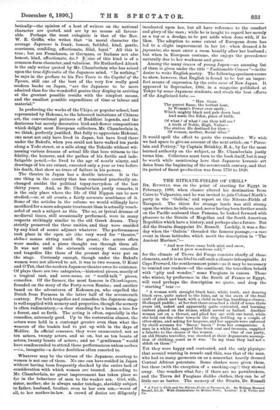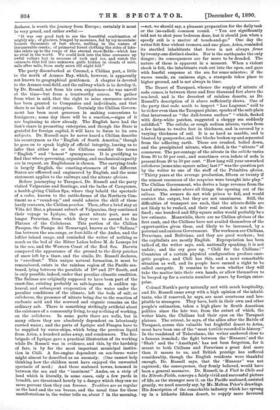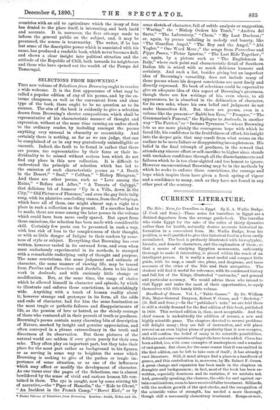THE NITRATE-FIELDS OF CHILI.*
Du. RUSSELL was on the point of starting for Egypt in February, 1889, when chance altered his destination from
Cairo to Valparaiso, and he was invited to join Colonel North's party in the Galicia,' and report on the Nitrate-Fields of Tarapaca. The thirst for strange lands was still strong upon the writer, he tells us, and, never having been further south on the Pacific seaboard than Panama, he looked forward with pleasure to the Straits of Magellan and the South American Republics which have a history, and perhaps also a future. Nor did the Straits disappoint Dr. Russell. Luckily, it was a fine day when the ' Galicia' threaded the famous passage,—a rare event in those latitudes, which merit the description in " The Ancient Mariner,"—
" And now there came both mist and snow, And it grew wondrous cold,"
for the climate of Tierra del Fuego consists chiefly of these elements, and it is no libel to call such a climate inhospitable. At Cape Froward, the southernmost point—as it may be necessary to remind our readers—of the continent, the travellers beheld with " pity and wonder," some Fuegians in canoes. Those who winter, by preference in the South of France or Egypt, will read perhaps the description we quote, and drop the " starting " tear :—
" A woman with straight black hair, white teeth, and dancing black eyes, quite naked to the loins, sat in the stern of the frail craft of plank and bark, with a child in her lap, handling a clumsy, ill-shaped paddle ; at her feet there crouched a child of some three years old, naked and apparently quite contented, and burning embers placed on the stones, which served as ballast. Another woman sat on a thwart, and plied her oar with one hand, while she held out the other towards the ship, holding up a couple of otter-skins, and asking for largesse, and her appeals were enforced by shrill screams for Bacca! bacca!' from her companions. A man in a white hat, ragged blue frock coat and trousers, supplied a falsetto to the chorus of the women. . . . . . One of our party, an old Straits traveller, was shocked at their degenerate assump- tion of clothing, scant as it was. In my time they had not a stitch on them I' "
Yet they were happy and contented, and the only physique that seemed wanting in muscle and thin, was that of the man, who had as many garments on as a somewhat heavily dressed Central African potentate. Some clothes were given them, but these (with the exception of a smoking-cap !) they stowed away. One wonders what for ; if there are no pawnbrokers, and the Tierra del Fnegians dislike clothes, they can be of little use as barter. The scenery of the Straits, Dr. Russell
• A Visit to Chile and the Nitrate-Pields of Taropaci, Sc. By William Howard Mune% LL.D. With illustrations by Melton Prior. London J. B. Virtue and Co.
declares, is worth the journey from Europe; certainly it must be very grand, and rather awful "It was our good luck to see the beautiful combination of mighty alp ; of glaciers, fringed by moraines, fed by icy mountain- breasts thousands of feet above, melting in the waters of innumerable creeks ; of primteval forest clothing the sides of lake- like inlets up to the verge of the eternal snow-fields—which has no rival in the world. We could look into the blue crevasses up awful valleys lost in recesses of rock and ice, and watch the cataracts that fell into unknown gulfs hidden in clouds of mist, mile after mile, from early morn till night fell."
The party disembarked at Coronel, a Chinon port, a little to the north of Aranco Bay, which, however, is apparently not known to geographical gentlemen. A chapter is devoted to the Aranco coal-field, and the railway which is to develop it, by Dr. Russell, not from his own experience—he was unwell at the time—but from a trustworthy source. We gather from what is said, that the right to mine enormous estates has been granted to Companies and individuals, and that there is no lack of enterprise. Certainly the Chilian Govern- ment has been most generous in making concessions to foreigners ; some day there will be a reaction,—signs of it are beginning to show already. The English have had the lion's share in promoting enterprise, and though the State is grateful for foreign capital, it will have to listen to its own subjects. Dr. Russell says he never heard a Chilies describe his countrymen as the "English of South America," though he goes on to speak highly of official integrity, leaving us to
infer that either he or the Chilians consider the terms 4' English " and " honest " synonymous. It is gratifying to
find that where governing, organising, and mechanical capacity are in request, an Englishman is chosen. The carrying-trade is largely English, the coasting-steamers of the different States are officered and engineered by English, and the same
statement applies to the railways and the nitrate oficinas.
Before journeying to Tarapacti„ Dr. Russell and the party visited Valparaiso and Santiago, and the baths of Cauquenes, a health-giving Chilian Spa, where they beheld the spectacle
of a rodeo, known to the cattle-farms of the Northern Con- tinent as a "round-up," and could admire the skill of those hardy centaurs, the Chilian gauchos. Then, after a brief stay at
Villa del Mar, a pleasant suburb of Valparaiso, they continued their voyage to Iquique, the great nitrate port, now no longer Peruvian, from which they were to ascend to the Plateau of the Calicheras. This portion of the Chili= Pampas, the Pampa del Tamarugal, known as the " Salinas," lies between the sea-range, or foot-hills of the Andes, and the loftier inland range, and reminded the writer of nothing so much as the bed of the Bitter Lakes before M. de Lesseps let in the sea, and the Western Coast of the. Red Sea. Darwin compared the appearance of the ground to the dirty patches of snow left by a thaw, and the simile, Dr. Russell declares, is "excellent" This unique natural formation, it must be remembered, exists in the rainless region of the Pacific sea- board, lying between the parallels of 19° and 27° South, and is only possible, indeed, under that peculiar climatic condition.
The Salinas are originally supposed to have been part of the ooast-line, existing probably as salt-lagoons. A sudden up-
heaval, and subsequent evaporation of the water under the peculiar conditions of the climate, left the beds of salt, or calicheras, the presence of nitrate being due to the reaction of carbonic acid and the seaweed and organic remains on the
ordinary salt. There is something strikingly artificial about the existence of a community living, to say nothing of working,
on the calicheras. In some parts there are wells, but in many others they are absolutely dependent on laboriously carried water; and the ports of Iquique and Pisagua have to be supplied by water-ships, which bring the precious liquid from Arica, a hundred miles away, and condensers. The fire-
brigade of Iquique gave a practical illustration of its working while Dr. Russell was in evidence, and this, by the hardship of fate, is by far the most important municipal institu- tion in Chili. A fire-engine dependent on sea-borne water might almost be described as an anomaly. (One cannot help thinking how the children must have. enjoyed the unwonted spectacle of mud.) And these seaboard towns, hemmed in between the sea and the " imminent " Andes, on a strip of land which is literally, in some cases, only a few yards in breadth, are threatened hourly by a danger which they can no
more prevent than they can foresee. Temblors are as regular as the land and the sea breeze, and the usn,91 time for these manifestations is, the writer tells us, about 7 in the morning, --not, we should say, a pleasant preparation for the daily task or the. (so-called) common round. " You are significantly told not to shut your bedroom door, lest it should jam when a speedy exit is a matter of touch-and-go." One day the writer felt four violent tremors, and one place, Arica, reminded its startled inhabitants that terra is not always firma by twenty-one distinct shocks. Nor is the earthquake the only danger ; its consequences are far more to be dreaded. The nature of these is apparent in a moment. When a violent shock is felt, the inhabitants rush out into the open, and gaze with fearful suspense at the sea for some minutes; if the waves recede, an ominous sign, a stampede takes- place to higher ground, and is not always in time.
The Desert of Tarapaca, whence the supply of nitrate of soda comes, is between three and four thousand feet above the sea-level, and is the dreariest of rainless deserts, as Dr. Russell's description of it above sufficiently shows. One of the party that rode south to inspect " Las Lagunas," said to be richer even than the Tarapacti plains, speaks of the salt-plain that intervened as "the dull-brown surface" " which, flecked with dirty-white patches, suggested a choppy sea suddenly solidified." The caliche, or rough sodium nitrate, varies from a few inches to twelve feet in thickness, and is covered by a varying thickness of soil. It is as hard as marble, and is blasted by gunpowder, and the blocks broken up and separated from the adhering earth. These are crushed, boiled down, and the precipitated nitrate, when dried, is the " nitrate " of commerce. The per-centage of the nitrate in the caliche varies from 30 to 50 per cent., and sometimes even iodate of soda is present from 20 to 50 per cent. "How long will your anworked calicheras [some nine square miles] last P" was the question put by the writer to one of the staff of the Primitiva " Thirty years at the average production, fifteen or twenty if the utmost resources of the maquina were brought into play." The Chilian Government, who derive a large revenue from the taxed nitrate, desire above all things the opening out of the salinas. The owners do not wish prices to fall, and would restrict the output, but they are not unanimous. Still, the difficulties of transport are such, that the nitrate-fields are not likely to be rushed, and their real extent is not well de- fined ; one hundred and fifty square miles would probably be a low estimate. Meanwhile, there are no Chilian oficinas of the first rank, and the Chilians have not availed themselves of the opportunities given them, and likely to be increased, by a paternal and anxious Government. The workmen are Chilians, Peruvians, and Bolivians, and they are good workers ; but the capitalists are mostly English. Expropriation has been talked of, the writer says, and, nationally speaking, it is not unfair; and the cry goes up, " Chili for the Chilians ! " Countries of a certain physical configuration produce ener- getic peoples ; and Chili has this, and a most remarkable situation as well, and its people have earned a right to be called energetic. It remains to be seen whether they will take the matter into their own hands, or allow themselves to be buoyed up for a certain number of years by foreign enter- prise.
Colonel North's party naturally met with much hospitality, and Dr. Russell came away with a high opinion of the inhabi- tants, who if reserved, he says, are most courteous and hos- pitable to strangers. They have, both in their own and other people's estimation, taken a high place in South American politics since the late war, from the outset of which, the writer hints, the Chilians had their eyes on the Tarapaci plateau. The retreat, he says, of the allies after the Battle of Tarapacti, across this valuable but frightful desert to Arica, must have been one of the " most terrible recorded in history." In the roadstead of Talacnhano, the writer anchored close to a famous ironclad; the fight between the Huascar,' and the `Shah' and the 'Amethyst,' has not been forgotten, for it meant to both Chilians and Peruvians a great deal more than it means to us, and British prestige has suffered considerably, though the English residents were thankful enough, Dr. Russell says, that the Huascar ' was not captured; the consequence, they firmly believed, would have been a general massacre. Dr. Russell, in A Visit to Chile and the Nitrate-Fields, conveys a fairly vivid and successful picture of life, as the stranger sees it, on the Pacific seaboard, assisted greatly, we need scarcely say, by Mr. Melton Prior's drawings. His description of the remarkable industry which has sprung up in a hitherto lifeless desert, to supply more favoured
conntries with an aid to agriculture which the irony of fate. has denied to the place itself, is interesting, and both lucid and accurate. It is, moreover, the first attempt made to inform the general public on the subject, and, it may be presumed, the source is trustworthy. The writer, if he has lost some of the descriptive power which is associated with his name, has produced a readable book, which never becomes dull, and shows a clear insight into political situation and the attitude of the Republic of Chili, both towards its neighbours and those who have opened out the wealth of the Pampa del Tamarugal. •
























































 Previous page
Previous page